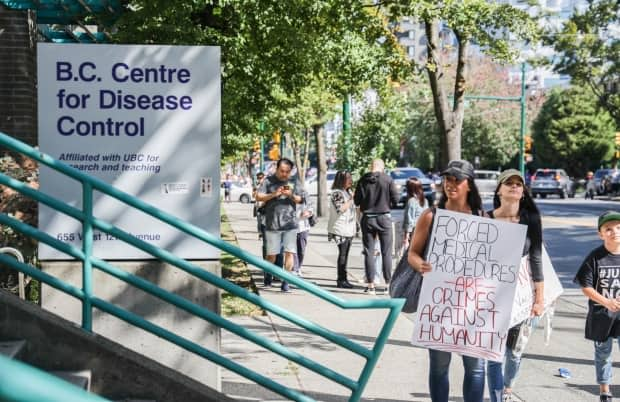Renowned mental health expert says anti-vaccine protests are fueled by distrust, unresolved trauma

The organizer of a large and contentious protest against COVID-19 vaccine requirements at a Kamloops, B.C., hospital one week ago says he has no regrets.
Glenn Aalderink, who is also a nurse at Royal Inland Hospital, admits his actions have made him a pariah in his community, but he says speaking out against the vaccine passport system was the right thing to do.
"I feel the government has no right to sit there within societal laws and dictate how we live our lives," Aalderink said.
And while those who support the science behind vaccine delivery might condemn Aalderink's actions, addiction specialist Dr. Gabor Maté says what's behind anti-vaccine ideologies — and similarly climate change denial — are people who feel alone, disconnected and less resilient than others.
"I believe that the sources of that rage and fear and distrust is actual trauma," says Maté. "Trauma has many different manifestations. Addiction is one of them."
Maté, 77, is a best-selling author, retired physician and Order of Canada recipient who has spent more than a decade working with people who have addictions in Vancouver's Downtown Eastside. He says Aalderink's ideologies as well as others in the anti-vaccine movement are rooted in childhood.
"We're looking at a lot of traumatized people who are finding a political outlet for their mistrust and anger. It's nothing to do with the issue itself, it has to do with the issue acting as a flash point for their own unresolved traumatic imprints," he said.

To wit, a massive and misleading rise in the anti-vaccination movement brought on by Charlamagne Tha God, a conspiracy theorist and U.S. radio host who claimed governments were putting microchips in the COVID-19 vaccine to track people's movements.
"If this guy walked into a doctor's office and expressed that point of view he'd immediately be labelled as a paranoid schizophrenic," Maté said.
But that sense of belonging within a group of people who support conspiracy beliefs brings temporary pleasure and a sense of power to vulnerable people, things Maté says can be addictive.
He says it's not an easy path for people who don't support the views of family, friends and colleagues opposed to public health orders, and that can lead to contempt, disdain and judgment within relationships.
"The only thing you can do is hold your ground, state your case, set your boundaries, and do all that with compassion for the other person. If it's within them to change — they'll change," Maté said.
Aaldenrink worries he could lose his nursing job, but says it's a price he is willing to pay for taking a stand. His wife-to-be has been double vaccinated and he supports her decision.
"That's the part that's lost in all of this, it's the freedom of our choice," Aalderink said.
"We don't stop people from smoking, we can't stop people from taking illegal drugs. They have a right to make their own decisions and reap the rewards or the risks of it," he said.

